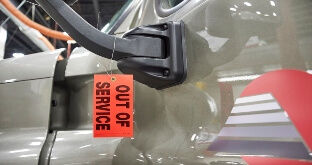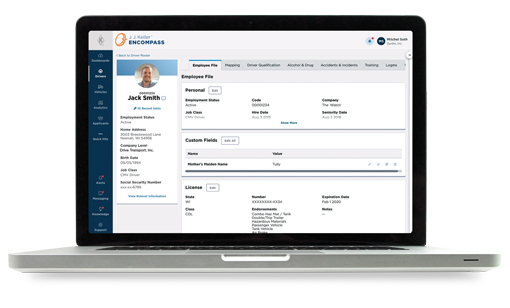Sr. Transportation Safety Editor — J. J. Keller & Associates, Inc.
5 Best Practices for Managing OOS Vehicles
Are you proactively managing the defective vehicles you've had to remove from service? Here are some best practices to consider.
Published On: 07/16/2021


Written by:
Daren Hansen
Are you proactively managing the defective vehicles you've had to remove from service? It's challenging, especially when the vehicle cannot be repaired quickly. Here are some best practices to consider.
1. Tag it. Lock it. Secure it.
First and foremost, you need to prevent the defective vehicle from being operated on a public roadway.
- For a tractor: Place a brightly-colored tag on the dash or steering wheel, covering the ignition switch if possible. Lock the doors and store all keys at the maintenance desk or a similar location.
- For a trailer: Put the tag on the emergency gladhand and add a gladhand lock. Store the key in a secure location.
Keep in mind: A vehicle that is in violation of Part 393 of the Federal Motor Carrier Safety Regulations cannot be operated in any area defined as a "highway" in 49 CFR §390.5. This includes any location, public or private, that is open to public travel without restrictive gates or signs.
The parts shortage caused by the COVID-19 pandemic has put some motor carriers in a tough spot, having to choose between removing vehicles from service to await repairs or keeping defective vehicles on the road to meet customer and service demands.
Putting a vehicle out of service impacts revenue and capacity, but letting that defective vehicle back on the road can be a DOT violation and significantly increase risk and liability.
2. Document the OOS condition
Use your vehicle tracking system to maintain the vehicle's known location and note that the vehicle is OOS and unavailable so that it doesn't get used or dispatched.
- Think of this as a "virtual" OOS tag that communicates the OOS condition to everyone who needs to know. A fleet management back-office system can maintain this information.
- You might also add the vehicle to an "inactive" vehicle list while you await repairs.
- Be sure to document why the vehicle is OOS and any special instructions about the repair process (such as whether the vehicle may be moved into a maintenance bay once the parts arrive).
- If you're audited, the DOT may want to see documentation showing that you had these controls in place to prevent the use of the vehicle on a public roadway.
3. Control access
Once the vehicle is locked down and taken out of rotation, you need to control who can operate it and when.
- Adopt a policy specifying who can move OOS vehicles for repair and who can remove both the actual and virtual tags and locks once repairs are complete.
- A tag or lock should only be removed after the qualified individual personally verifies that the defect has been repaired.
4. Get it back in service
Maintain timely and accurate documentation about the repair and the vehicle's transition back into active service.
- A DOT auditor should be able to review your documentation and see that the vehicle was fully repaired — and when — before being used on public roadways.
- Add the vehicle back to your "active" list and remove any warning flags in your vehicle maintenance system.
- Before the vehicle is dispatched, make sure the driver has access to the last completed post-trip inspection report (DVIR) if one was prepared. The driver must sign the report to acknowledge that repairs were completed, and the report must be stored for at least three months.
5. Communication is key
Make sure all affected employees know what you expect when a vehicle is placed OOS. Develop written policies and procedures for dealing with OOS vehicles, with the above recommendations in mind. Then, train all affected employees, so they know what to do.
By maintaining tight controls over your OOS vehicles, keeping good documentation, and training all affected personnel, you'll keep your operations on the road to compliance.
Simplify DOT Maintenance Recordkeeping with the Encompass® Fleet Management System
A vehicle maintenance program and recordkeeping are an FMCSA requirement and a best business practice. The Encompass® Fleet Management System can help you ensure your maintenance program is compliant and on track. Call 855-693-5338 to talk with a compliance specialist or request a conversation.
You may also enjoy the following articles:
Sign up for our newsletter!
We'll help you stay on top of regulations, best practices, and fleet industry news. Sign up to receive a monthly email notification with links to our most recent blog articles, free resources, and event invites.
